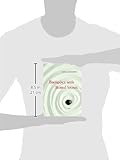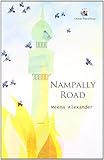Editor's Introduction
The 17th Century Kabbalist, Nathan of Gaza, speculated that before the world came into being, there were, in the endlessness of existence, two lights: the one, active, thinking, with the impetus to create; the other passive, concealed and full in itself. When the first light contracted itself to make room for creation, the second light resisted and remained unmoved. It is this second light that became the force we think of as evil in the world.
In this new poem by Meena Alexander, which, she tells us, was written during the recent bombing of Gaza, while she was reading the poet Nellie Sachs, nothing seems to hold still, as unity and becoming vie for the world. A well in a garden draws us in, out of the garden and into a mirror garden, where alphabets form themselves into place names, where the eternal myths of division play out. The natural world, the silent unified world that was there before language made us confront the uncreated, reasserts itself just outside of where we are in the poem, in a future after the myths have ended, in a place the unembodied speaker seems to inhabit. The poem seems to seek the silence in language, the silence that would turn time, with its syllables and sentences back into a place without a name. The place she evokes however, is a place that we who live in language cannot live in yet, as the world continues to be created, continues to be incomplete. The speaker, unencumbered by a body, gives an impossible vantage, leaves us feeling the weight of our own absence here. But the vantage, however fictional, leaves a promise. There is a healing, generous spirit in this poem, which seems to recount the encounter of creation with the fullness of the uncreated, and how we can learn to see what has been already created as the image, however unattainable, of this unity.
-Noam Scheindlin
POEM WITH BLUE AGAPANTHUS
I.
The garden was filled with cornflowers
And sprouts of sweet chamomile
Clouds tumbled overhead,
By the crab apple tree, a well of clear water.
Somehow we were pulled underwater.
In their brocade skirts, dolls pirouetted, then floated free.
I needed to be a dancer, mother knew this.
I see her pale hands, still fluttering.
II.
A bird perched on a black stone
A swallow at the edge of our garden.
A bird of parting if there ever was one.
Who knew it could sing like that ?
All night alphabets rose from damp soil,
They glimmered in the light of the cosmos
Then splintered into particles
Turquoise, ruby, jade, shadowy onyx:
We wanted light to etch our syllables together.
Place names drowned on our tongues.
III.
Above a strip of earth, by the ungovernable sea,
War planes hover. I watch the Angel of Ruin,
He is clothed in a twist of cloud,
His eyes are blue with a terrible blindness,
His hair a mess of snakes.
Why have you brought us here?
Where are the nets of mercy? He does not hear.
Lightening coils over him, a typhoon boils.
In one hand the angel grips a machine gun
In the other, a pen -- nib dark with blood.
Where was he when they lifted the tiny ones
Wrapped them in dusty white,
Dug holes in the ground, laid the infants there?
I saw those parents, their tears were the color of summer air.
For them too, the blossoms of death are quivering.
IV.
Lacking body, clothed only in a fistful of leaves,
I approach a woman whose name I do not know.
Sparks stitch her hands. Her womb is aflame.
She sees the school door swing open,
Sees the paint crack in sudden heat,
Hears the small exhalations, the panicked cries,
Sees streams of water grow dark,
Sees her child’s face melt into starlight.
V.
When the instruments of war are melted into fish hooks,
When the factories of death are finally stilled
When evil is swallowed up in a hot wind
That strikes our names into the base of the uncharted sea,
A garden fed by the streams of longing will rise up.
In limestone crannies the forget- me- not takes root
And how quickly the sky- blue agapanthus,
Flower of all love, restores itself.
VI.
Search for the laurel -- tree of flight and metamorphosis,
Bruised alphabets are cut into its bark,
They shine with red resin, glow in the dark.
In the shade of that tree you will find your child.
His clothing wet with sea salt
He crouches, picture book in hand, utterly bewildered,
A kite string tangled in his hair.
Go find him there, Beloved, wordless, waiting.
(Shimla 4 -13, August, NYC October 2, 2014 )
Poet’s Note:
I composed this poem during the bombardment of Gaza. I was reading Nellie Sachs and imagined her, a spirit now, witnessing what was taking place. I was in Shimla, in the Himalayas, far from the devastation. Walking in a garden filled with the sky blue agapanthus , I imagined the flower in another garden, in a world without war.
Meena Alexander is currently National Fellow at the Indian Institute of Advanced Study, Shimla. Her most recent book of poems is Birthplace with Buried Stones (TriQuarterly Books/ Northwestern University Press, 2013). Her poem `Acqua Alta’ was set to music by the composer Jan Sandstrom and performed by the Serikon Music Group in Sweden. www.meenaalexander.com
A recent interview with Meena Alexander from the Poetry Foundation.


